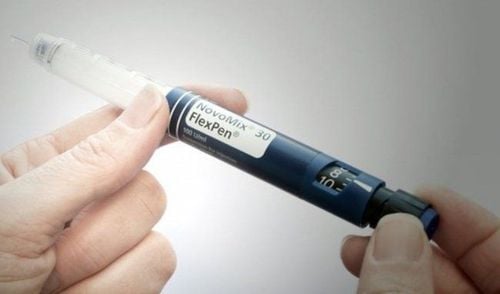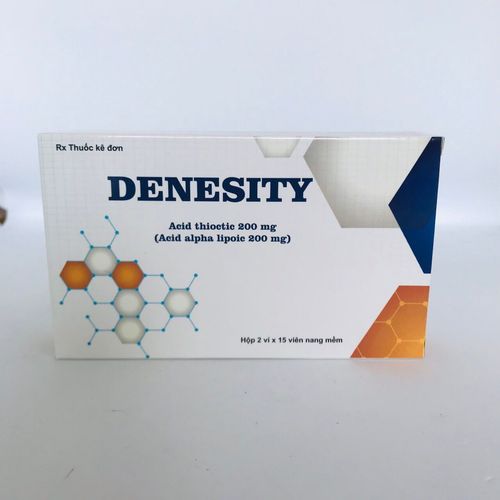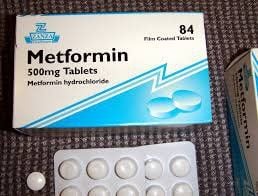This is an automatically translated article.
Glimediab is a prescription endocrine drug used in cases of type 2 diabetes. When using the drug, patients need to be careful to ensure safety and avoid interactions. Let's learn more about Glimediab drug about uses, dosage, usage, ... in the following article.
1. What is Glimediab?
Glimediab is a prescription drug that belongs to the category of diabetes drugs. The drug is manufactured by pharmaceutical company JSC "FARMAK" - Ukraine, registered by Asia Light Trading and Service Co., Ltd, registration number VN-19127-15.
Ingredients of Glimediab include: Giimepiride 200mg with Glimediab 2mg, Giimepiride 400mg with Glimediab 4mg. In addition, there are a number of excipients such as:
Lactose tmonohydrate; Mieroerystalline eellulose; Sodium starch glycolate; Povidone; Iron oxide yellow; Indigo carmine; Magnesium stearate; ... Glimediab is available in tablet form, in a rectangular white background, with blue text and ingredients.
2. Uses of the drug Glimediab
Glimepiride - an orally administered sulfonamide, with hypoglycaemic effect, belongs to the sulfonylure group. The primary action of Glimediab is to stimulate insulin release from the beta cells of the islets of Langerhans of the pancreas. The mechanism of action of Glimediab is to bind to beta-cell membrane receptors, closing ATP-dependent potassium channels. Closing this channel causes membrane depolarization, opening the channel, allowing increased potassium ions to enter the cell. Increasing the concentration of potassium ions in the cell stimulates the release of insulin from the cell.
In addition, the drug also has extra-pancreatic effects, improving the sensitivity of peripheral tissues to insulin and reducing insulin absorption in the liver. Glimediab rapidly increases the number of glucose transporters across muscle and adipocyte membranes, increasing glucose uptake into muscle and adipose tissue.
The hydroxy metabolite of glimepiride also has a mild hypoglycemic effect. However, it also contributes only a small part to the total hypoglycemic effect. Glimediab has a synergistic effect with metformin or with insulin.
3. Indications for use of the drug Glimediab
Glimediab is indicated for adults with non-insulin dependent diabetes, when blood glucose cannot be controlled by diet, exercise and weight loss.It is possible to combine Glimediab and Metformin or with Glitazone or with insulin.
4. Dosage – how to take Glimediab
To ensure safety, when using Glimediab, it is necessary to follow the instructions of the doctor.
4.1 Glimediab Dosage The dose of Glimediab depends on blood sugar and the patient's tolerability. Starting dose of 1mg/day, after about 1-2 weeks blood sugar is not controlled, need to increase the dose until effective glycemic control is achieved.
The maximum dose of Glimediab 2mg is 8mg/day. Usually, doses of 1 to 4 mg/day are met. In rare cases, it is necessary to increase the dose to 4-8mg/day. Glimediab 4mg/day is only effective in some special cases.
Dosage for subjects with liver and kidney failure
This group of subjects needs to take an initial dose of 1g/day. Adjust dose up if fasting blood glucose levels remain high. In case the creatinine clearance is less than 22ml/min, the doctor will prescribe 1mg/day and no need to adjust the dose.
Dosage if switching drugs
If you are in the group of subjects who are taking other antidiabetic drugs but are not effective, so you should switch to Glimediab 4mg, you need to use the starting dose of 1mg / day and then adjust the dose.
If the previous drug is used for a long time or has an additive interaction with Glimediab 4mg, the drug can be stopped for a while.
Dosage when combining drugs and metformin or glitazone
When you can't control blood sugar when you take a drug alone, it can be combined with metformin or glitazone. Adjust the dose starting from the low dose of each drug. Thereafter, the dose can be increased gradually until effective glycemic control is achieved.
When Glimediab 4mg is used concurrently with Metformin the risk of glimepiride-related hypoglycemia may persist and may be increased. Therefore, extreme caution is required.
Use in combination with drugs and insulin
After taking Glimediab 4mg for a while, using a single dose of 8mg / day but not controlling blood sugar can be used in combination with insulin.
Start with the lowest dose of insulin and gradually increase it until blood sugar is controlled. Results should be checked by daily blood glucose monitoring.
4.2 How to take Glimediab Glimediab is to be taken once a day before or after meals. Patients need to take the tablet whole with filtered water (drink plenty of water) without chewing or crushing the tablet, because it will affect the effectiveness of use. If you discover that you have forgotten your medicine, you should inform your doctor, do not take it immediately. After taking Glimediab 2mg, there is a response by lowering blood sugar. At this point, you just need to adjust with your diet and moderate exercise according to the instructions. When blood sugar is controlled and stable, insulin sensitivity will improve. The dose adjustment needs to be changed to avoid hypoglycemia when the patient's weight, lifestyle changes or there is a combination with drugs and other factors that increase/decrease blood sugar.
5. Glimediab . interaction
During the use of Glimediab may also cause some drug interactions. Some drugs have the potential to increase the hypoglycemic effect of Glimediab such as:
Insulin; Chloramphenicol; Coumarin derivatives; Cyclophosphamide, Disopyramide; Ifosfamide; Non-steroidal anti-inflammatory drugs (paraaminosalicylic acid, salicylates, phenylbutazone, ...); Probenecid; beta blockers; ACE inhibitors; Anabolic steroids and male sex hormones.; Besides, when used together with one of the above drugs with Glimediab 2mg may lead to the risk of hypoglycemia, so the dose should be adjusted accordingly.
In addition, diuretics, sympathomimetic drugs... when combined with Glimediab also need to be cautious.
6. Glimediab . side effects
The most important adverse effect of Glimediab is hypoglycemia. When this occurs, the same treatment should be performed as an overdose. Some possible side effects while taking Glimediab 4mg include:
Dizziness; Nausea and vomiting; Stomachache; Flatulence; Headache; Temporary visual disturbances; Medal; Itchy; Jaundice; Anemia ; Allergic vasculitis; To ensure safety, it is necessary to inform the doctor about the side effects when using Glimediab for guidance and management.
7. Glimediab . Warnings and Precautions
Some warnings and cautions from the manufacturer when using Glimediab are as follows:
It is necessary to explain to the patient when taking hypoglycemic drugs - Glimediab but still must be combined with appropriate nutrition and exercise; Patients with poor nutrition, underlying diseases (liver failure, kidney failure, pituitary failure, ..) are prone to hypoglycemia when taking Glimediab. Therefore, this object needs to be monitored and handled accordingly. For patients who are stable on treatment regimen with Glimediab 2mg may not be able to control blood sugar under stress, surgery or infections... Therefore, insulin should be used in combination with glimepiride or alone. insulin instead of glimepiride. Using Glimediab as well as some other blood sugar lowering drugs after a while may no longer be effective in lowering blood sugar. At this time, it is necessary to adjust the dose or combine with other drugs. For the elderly, users of beta blockers, .. should pay attention to the manifestation of hypoglycemia for timely treatment. It is necessary to periodically monitor blood sugar every 3-6 months, if necessary, adjust the regimen accordingly. Subjects driving, operating machinery when using Glimediab drug may not be stable, especially when taking the starting dose or when there is an adjustment in the treatment regimen. Pregnant women should not take Glimediab, as studies have shown a risk of fetotoxicity, teratogenicity, and miscarriage. If you have taken the drug, but the patient suspects that she is pregnant, she must notify the doctor for the best screening measures. Glimediab may cause certain effects in nursing women, so stop the drug while breastfeeding or use alternative treatments such as insulin. Storage Glimediab store at room temperature. Glimediab is used to lower blood sugar in patients with diabetes. Medicines are used by prescription, under the direction of a doctor. To ensure safety, please consult your doctor / pharmacist for information on usage, instructions for use, dosage...
Follow Vinmec International General Hospital website to know more health information , nutrition, beauty to protect the health of yourself and your loved ones in the family.













